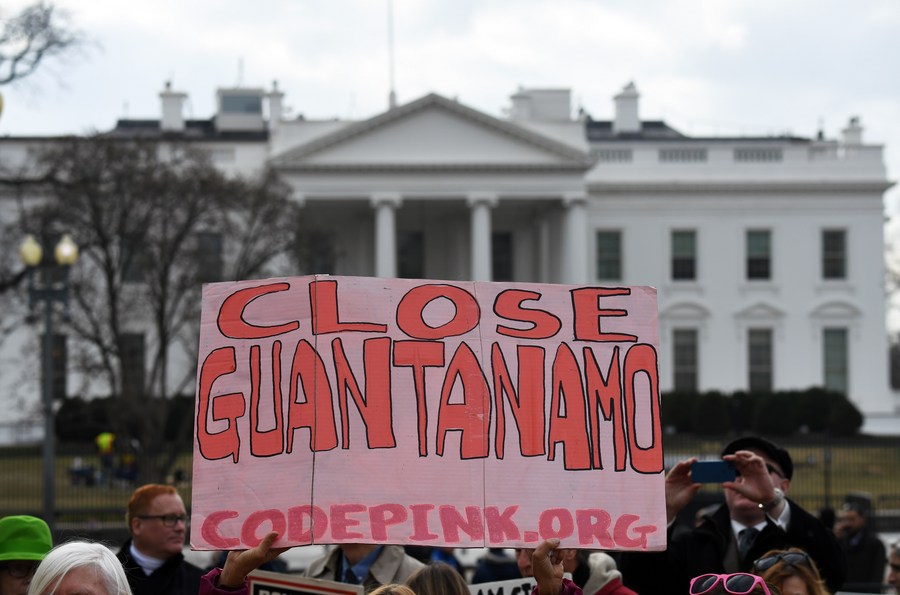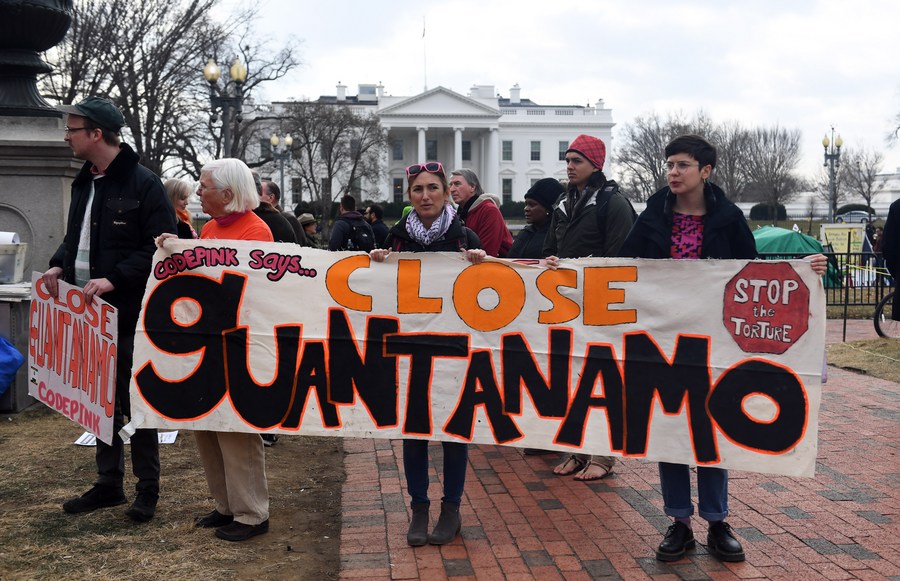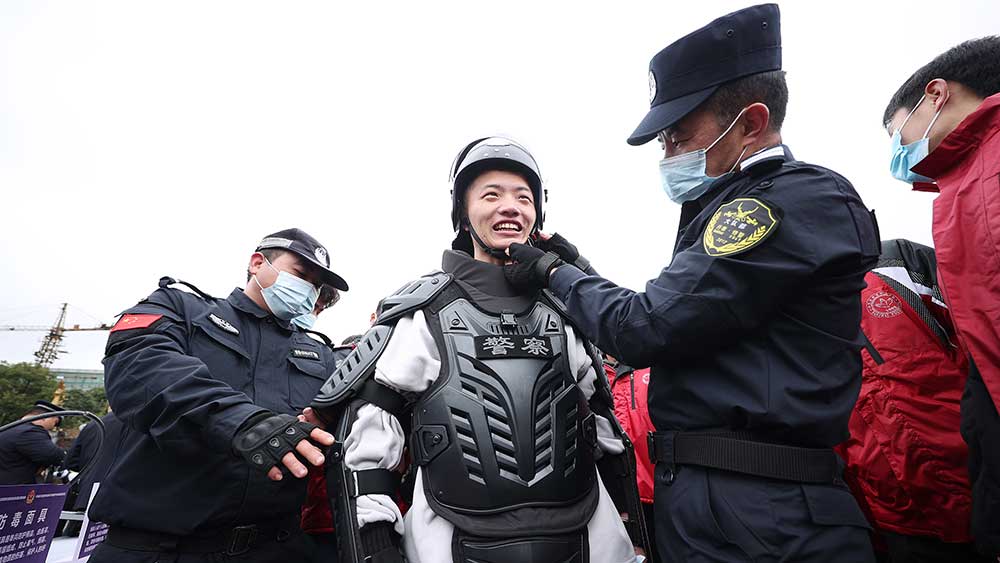
Protesters rally to demand the closing of the Guantanamo Bay detention camp outside the White House in Washington D.C., the United States, on Jan. 11, 2018. (Xinhua/Yin Bogu)
Over the past two decades, nearly 780 inmates have passed through the cells of the U.S. military prison, where they were reportedly subjected to torture and other brutal treatment. Thirty-nine men are still there. Of them, a dozen have been charged with war crimes, while the rest are either eligible for transfer or continue to be held under indefinite detention.
WASHINGTON, Jan. 11 (Xinhua) -- The notorious Guantanamo Bay detention facility, a symbol of U.S. torture and abuse of prisoners, marked on Tuesday the 20th anniversary of the first prisoners' arrival, amid renewed calls that it be shut down and America reflect on its poor human rights record.
"Today is a day to reflect, and to act," U.S. Congresswoman Ilhan Omar wrote in an op-ed published in Teen Vogue on Tuesday. "For those of you who don't know much about Guantanamo and all that it represents, I urge you to educate yourselves ... I am confident that the more you learn, the more appalled you'll become."
The detention site at Guantanamo Bay naval base on the island of Cuba admitted its first detainees on Jan. 11, 2002, as part of the U.S.-led global "War on Terror" in response to the Sept. 11 terrorist attacks in 2001, which killed nearly 3,000 people on American soil.
Over the past two decades, nearly 780 inmates have passed through the cells of the U.S. military prison, where they were reportedly subjected to torture and other brutal treatment. Thirty-nine men are still there. Of them, a dozen have been charged with war crimes, while the rest are either eligible for transfer or continue to be held under indefinite detention.
"Around the world, Guantanamo is a symbol of racial and religious injustice, abuse, and disregard for the rule of law," said Hina Shamsi, director of the National Security Project at the nonprofit American Civil Liberties Union, in a statement on Tuesday.
"All of the prisoners have been exposed to the physical and psychological trauma associated with prolonged indefinite detention," Shamsi continued. "Our government's embrace of systematic torture shattered lives, shredded this country's reputation in the world, and compromised national security. To this day, it has refused to release the full details of the torture program or to provide justice and redress for all the many victims."
Khalid Qasim, a Yemeni national who has been detained without charge or trial at Guantanamo since 2002, described his days at the detention camp in an opinion published by The Guardian on Sunday.

Protesters rally to demand the closing of the Guantanamo Bay detention camp outside the White House in Washington D.C., the United States, on Jan. 11, 2018. (Xinhua/Yin Bogu)
"For the first nine years at Guantanamo, I was held in solitary confinement. It was a harsher, more violent place then," Qasim wrote. "The communal blocks that opened in 2010 made a difference, but the deliberate mental torture remains the same. The rules change constantly and without warning. Some guards and some administrations are more cruel than others."
"The torture we are exposed to is not isolated to the interrogation rooms; it exists in our daily lives. This intentional psychological torture is what makes Guantanamo different. There is interference in every aspect of my existence -- my sleep, my food, my walking," he added.
Between 2002 and 2021, nine detainees died in custody Guantanamo, two from natural causes and seven reportedly committed suicide. None had been charged or convicted of a crime.
U.S. President Joe Biden announced shortly after he took office that his administration will move to put an end to the Guantanamo Bay prison. His administration transferred one detainee out of the detention center in July 2021.
Pentagon press secretary John Kirby told reporters on Monday that the White House continues "to be committed to closing down that facility" but refused to disclose what progress had been made.
Omar also underlined the U.S. "Congress has acted to frustrate rather than facilitate closing Guantanamo," while urging the White House "to dramatically pick up the pace" on the issue.
A group of independent human rights experts appointed by the United Nations Human Rights Council also condemned the continued operation of Guantanamo.
"Despite forceful, repeated and unequivocal condemnation of the operation of this horrific detention and prison complex with its associated trial processes, the United States continues to detain persons many of whom have never been charged with any crime," the experts said in a statement released on Monday.
"Guantanamo Bay is a site of unparalleled notoriety, defined by the systematic use of torture, and other cruel, inhuman or degrading treatment against hundreds of men brought to the site and deprived of their most fundamental rights," they said, going on to describe the facility as a symbol of a systematic lack of accountability for state-sponsored torture, ill-treatment, and impunity granted to those responsible.
Since the opening of the detention center, only 12 individuals are reported to have been charged, with just two convicted by military commissions.
The trial of five detainees accused of directly participating in the 2001 plot that led to planes being hijacked and flown into New York City's Twin Towers and the Pentagon has still not begun.
Pre-trial hearings on motions to suppress evidence of torture are now going into a tenth year. In their statement, the UN experts expressed deep concern at these delays.
"We particularly highlight the failures of the United States judicial system to play a meaningful role in protecting human rights, upholding the rule of law and enabling a legal black hole to thrive in Guantanamo with their apparent approval and support," they added.
Lee Wolosky, former U.S. special envoy for Guantanamo closure, also published an op-ed piece on Tuesday in Politico looking back at the "legal and policy morass" that had developed around the prison.
"A task that many saw as a matter of decisively turning the page on a dark chapter in American history turned out to be much messier, more tedious and more legally and politically fraught than I anticipated," Wolosky observed. "Our longest war has ended, yet Guantanamo endures." ■












